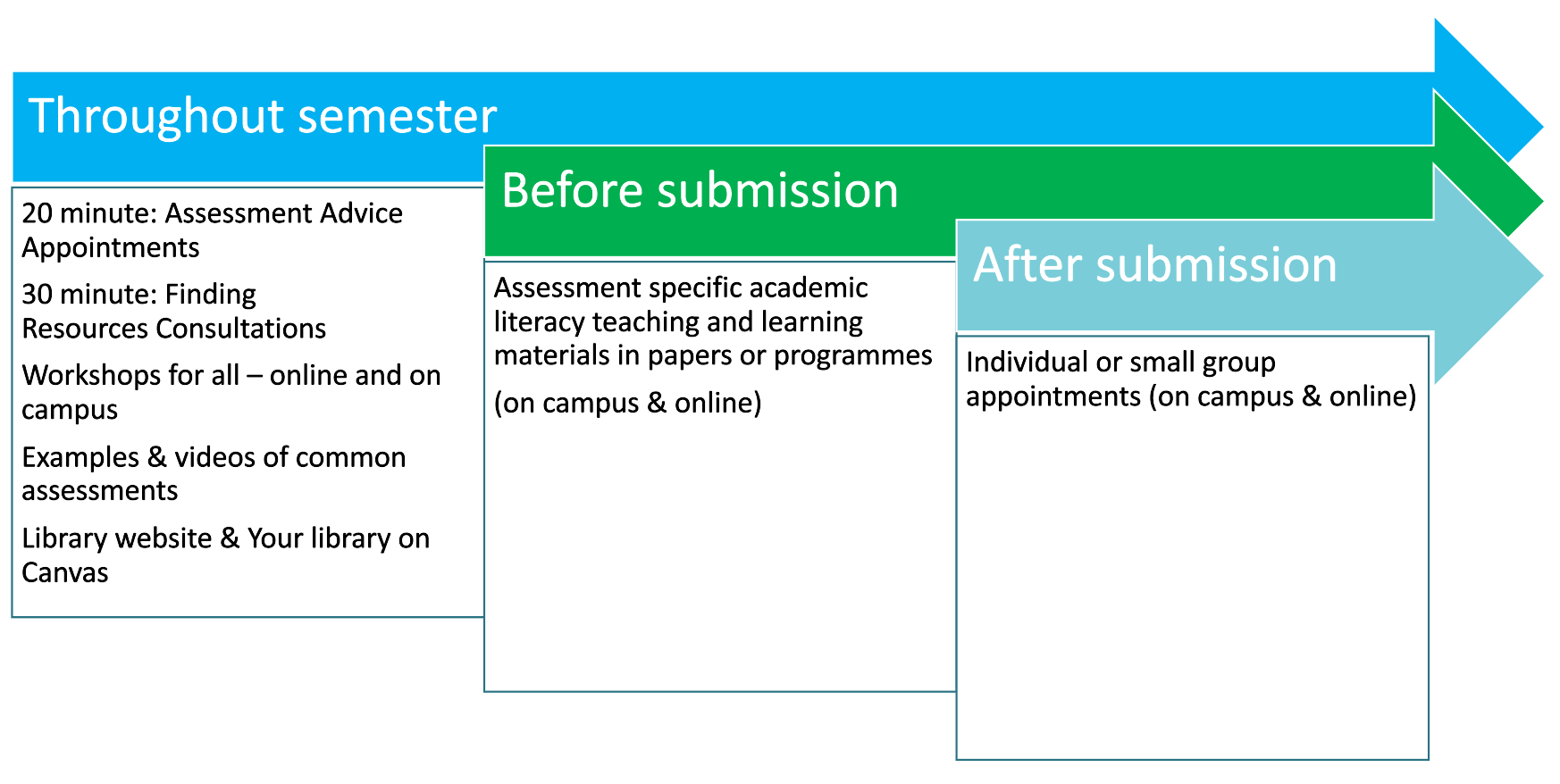- City: closed
- North: closed
- South: closed
- More opening hours.
Search our:
Search our:
Learning & Academic Engagement staff work with students and lecturers to develop student academic literacies by designing and delivering support for assessments in multiple modes.

Showing students how to select and use images to complement written content for a specific assessment. This is part of a series of short videos about how to critique a blog post and also write a blog.
Other examples of videos created for specific needs are available in this YouTube playlist.
Learning & Academic Engagement staff collaborate with lecturers and other faculty staff to create teaching and learning materials that are integrated with curriculum content. These are designed cumulatively across papers in a programme of study. Our goal is to create online and face-to-face resources for academic literacy development that are relevant to students as they work on their current assessments.
The essential steps for collaborating are below. The design of our materials focuses on using sample assignments.
Students have direct access to Learning & Academic Engagement staff through appointments and workshops.
The essential steps for working with undergraduate and postgraduate coursework students are below. Our focus is on working with lecturer feedback.
At AUT, a research student is someone who is currently doing a research project as part of one of the following programmes:
The essential steps for working with research students and their supervisors are below. Our focus is on working with supervisor feedback. Supervisors request appointments on behalf of their students.
Appointments occur once the student’s work has been commented on by supervisors. In accordance with AUT’s proofreading guidelines for student assessments and the guidelines for the proofreading of postgraduate theses and dissertations at AUT, Learning & Academic Engagement staff do not proofread or check student work. Students may have approximately two appointments per semester. per student for each semester.
Research students have direct access to academic writing advisors through thesis writing workshops, drop-ins and general workshops on academic writing. Research students can also book into workshops run in collaboration with the Graduate Research School .
We are engaged in research relevant to our practices, and welcome collaborative projects with other AUT researchers and international partners.
Dr Lucy Macnaught, Karen Margetts, Vanessa van der Ham & Mark Bassett (Te Mātāpuna Library & Learning Services)
Dr Chris Jenkin & Dr John Milne (AUT School of Education)
July 2019 - present
This project focuses on the implementation and evaluation of a new approach to teaching academic writing development. It involves School of Education lecturers using a suite of teaching and learning materials that target the writing demands of a specific paper – a teaching practice commonly known as ‘embedding’. These materials are prepared in collaboration with Learning Success staff. The goal is to create and deliver materials that are relevant to specific assignments that students have to write, and to do so in a way that is flexible and accessible to current and future faculty teaching staff. The main innovative aspect of the project includes a focus on lecturers gradually taking more responsibility for the literacy development of their students, rather than this area of teaching being ‘outsourced’ to other AUT staff.
Mark Bassett & Dr Lucy Macnaught
Sep 2018 – present
This project focuses on how students experience online learning resources related to academic literacy development. It forms part of a larger Library website project to redevelop the website. The research design centres on user experience (UX) research methods where students are involved in the design process. Data are analysed using theoretical frameworks within the Applied Linguistic tradition of Systemic Functional Linguistics. Discourse analysis identifies reoccurring student responses related to: what and how they evaluate the website; how they meaningfully group and label website content; and the type of webpage layout that they think is effective and user-friendly. Findings are expected to generate design principles that will inform specific changes to the current website. The research findings will also be the foundation for further and iterative user experience research related to the development of students’ academic literacies.
Mark Bassett
Completion: 2021
This PhD research investigates the collaboration between learning advisors and lecturers as they co-design and integrate academic literacies into subject content. Findings are expected to capture varied practices and identify key aspects that are critical to effective collaboration. An intended outcome is to improve working relationships between learning advisors and lecturers for the benefit of students’ academic literacy development.
If your students have breached academic integrity, here’s how the learning advisor team can help.
Workshops for your students
Videos
Students can view videos and examples of academic writing, paraphrasing and referencing.
Turnitin
Students can view these short videos:
Lecturers can view this short video about how to adjust Turnitin settings to allow multiple submissions (which can provide students with opportunities to improve on their use of other people’s words and ideas before final submission):
For more help:
Contact learningsuccess@aut.ac.nz